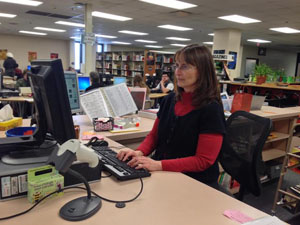New tech plan leaves media specialists disconnected

Media specialist Debra Snell works in South’s media center. “This year, I spend very little time troubleshooting,” said Snell.
March 11, 2014
“Someone didn’t understand that we needed this money,” said Debra Snell, South’s media specialist. After media specialists were informed that they would not be receiving any budget for purchasing new books, tensions rose. This money was greatly needed in order to replace missing books and keep the library relevant with new ones.
This event caused some media specialists to feel that they weren’t being represented properly at the district level. Thankfully, the budget was quickly restored after worries were brought to the attention of South’s staff, parents, and Superintendent Bernadeia Johnson.
Some attributed this budget scare to the recent reorganization of the Information Technology (IT) department, which the media specialists are currently a part of. This restructuring is being implemented by Rich Valerga, the Chief Information Officer (CIO), and has resulted in numerous changes for tech and media specialists at South. “This year all the techs report to the district as opposed to the school they work at. This can be a good thing,” Snell explained, “They could get conflicting requests which would be frustrating. The new process streamlines who they report to.”
Ben Roberts, South’s technical support specialist, agreed that there are definite benefits of the new IT system. “Overall I think it’ll end up being more efficient. Now you don’t hop in between schools all the time.”
Snell did voice the growing concern of the recent disconnect between tech and media specialists because of the new system. “Media and tech have always been a team,” she explained. “While there is still quite a bit of cooperation between media and technology the streamlining has made joint decision making much more difficult.”
English Teacher Nicole Schneider believes that the communication between the tech and media specialists is a key component to the success of the library. “They’re very interconnected,” Schneider explained. “Libraries are more electronic and everything needs to be updated constantly.”
The media specialist’s tech knowledge has not gone unnoticed. Junior Bryan Katz-James said that they’re the first people he talks to when he has technological difficulties. “They’ve helped me by giving me tech support. I’ll need to know how the printer works or the like and I’ll go to the librarian…” he went on to explain that this help can be valuable with the ever growing use of technology in the classroom, “becoming inextricable tangled in the process of learning.”
This overlap of tech and media responsibilities for media specialists happened almost accidentally. “Often, media specialists were the first ones to learn the new programs and share them with the teaching staff,” said Snell. As the use of technology increased the position of technical support specialist was introduced, but media specialists still stayed very involved in the integration of new technology. “Techs bring technical knowledge to decision making and media specialists contribute an understanding of classroom needs… When the district was going to implement a new piece of technology they would train the media specialists as well as the techs.”
“Media center specialists and tech have always had a close proximity so we end up working together a lot.” Roberts added. Although the restructuring has decreased district communication between tech and media specialists, Roberts has tried to maintain a good relationship with the library staff at South. “I’m just trying to help them out…” Roberts explained. “My job has always been the same. It’s just to help teachers, students, lots of people. Most of the changes are at the district level, but for us building techs everything will pretty much stay the same.”
Though the tech’s job responsibilities may not have changed the media specialists have had to adjust to a drastically different schedule. “Last year I spent a little over half of my day working with the building tech in troubleshooting technical issues for teachers. This year, I spend very little time troubleshooting,” Snell stated. “[media specialist] Ms. Main and I have focused our time on the library program. So far we have started a quarterly newsletter for staff, weeded out many old books from the fiction section, started the free bookshelf that you can find outside of the library, focused on displaying books in a way that makes it easy to find interesting titles.”
This change in job responsibility is accompanied by a fear of the future. Valerga, the Chief Information Officer, followed a similar IT restructuring plan in the St. Paul School district before working within the Minneapolis IT department. This plan ended with many media specialists being replaced by media clerks, who are not specialized in the educational aspect. Though there is no confirmation of this type of replacement being enacted here, the lack of clarity from the IT department has many feeling uneasy.





